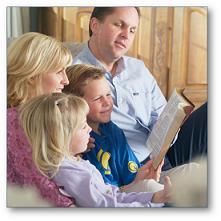Parental Catechizing of Youth
Parental Catechizing of Youth
(The following article is extracted from an office-bearer's conference address delivered by Elder Nick Greendyk on June 19, 1984 in Grand Rapids, Michigan. Elder Greedyk's paper addressed itself to the following method: (1) explain what is meant by catechizing; (2) show why we must catechize; (3) indicate by whom it must be done; and (4) offer some suggestions on how this work may best be performed. This extract is taken from the third section and underscores the much-neglected need for parental catechization. Truly, the vast majority of parents among our congregations are living far short of the exemplary model established by our Reformed and Puritan forefathers who catechized their children on a daily basis. May the Lord bless this article to the revival of this practice among our parental readership. Rev. J.R.B.)
 The third question we now address ourselves to is, Who should perform this important work of catechizing? Our answer is: parents, schoolteachers, and office-bearers. It may surprise many of you, especially at an office-bearer's conference, to hear that my first answer to this question is not ministers, or elders, but parents.
The third question we now address ourselves to is, Who should perform this important work of catechizing? Our answer is: parents, schoolteachers, and office-bearers. It may surprise many of you, especially at an office-bearer's conference, to hear that my first answer to this question is not ministers, or elders, but parents.
Oh, how deeply parents are obliged to this duty is written so clearly in the Scriptures, where we find precept upon precept, example upon example, and arguments enough to prove it! When we come to realize this for ourselves, surely many of us who are parents must fly to that fountain opened for sin and uncleanness for our sins, both of omission and commission, as we reflect on how short we came, or still come, in this all-important duty of catechizing our own children.
The Israelites in the Old Testament were bound to tell in the ears of not only their sons, but of their sons' sons also, what things the Lord had wrought in Egypt, that they might know Jehovah to be the Lord. (Ex. 10:2) They were bound also to be expositors of that great rite of the paschal lamb, as we find it in Ex. 12; and of the stones set up in the midst of Jordan. (Joshua 4) They were bound also to teach their children the words which they heard from the Lord their God in Horeb, even the ten commandments. (Deut. 4) And, once again, how does this duty sparkle before us with a radiant lustre in that great text from Deut. 6:6, 7: "These words, which I command thee this day shall be in thine heart: and thou shalt teach them diligently unto thy children, and shalt talk of them when thou sittest in thine house, and when thou walkest by the way, and when thou liest down, and when thou risest up." Listen to the venerable Henry Ainsworth, that 16th century Puritan, who fled from persecution to Holland, where he remained until his death in Amsterdam. He explains the text this way:
It is the eternal God," says he, "that here gives forth His strict command to parents. 'These words,' that is, all these words; the precepts, the promises, the threatenings; 'shall be in thine heart', not in thy head only so as to know them, but in thy heart also so as to affect it. A heart inflamed with the love of God and His truth, God knew, was one of the most effectual means to engage the tongue to make known His truth. But not only in their heart, but in their houses, too, for 'thou shalt teach them diligently unto thy children!' Nor was this only a ceremonial precept, or a command given only to the Jews, but was and is a moral, perpetual, standing precept, binding us in gospel times as well as then.
And the same things which we find in this text in the Old Testament, we find also in the New Testament, in Col. 3:16, where we read, "Let the word of God dwell in you richly in all wisdom," which, says Thomas Lye, is all one and the same with the text out of Deuteronomy: "Let it be in thine heart."
Next, we have examples enough in our Bible that it was the practice of the saints of old to instruct their children in the things of God. Surely Adam must have instructed Cain and Abel to bring offerings to the Lord. And from Adam to the time of Moses, a space of two thousand years, how was the true religion communicated but by oral tradition from parents to their children? Of Abraham God said, "I know Abraham, that he will command his children and his household after him; and they shall keep the way of the Lord, to do justice and judgment; that the Lord may bring upon Abraham that which He hath spoken of him."
Look at Job: "None like him in the earth: that perfect and upright man", he is called in the Bible. He sends and sanctifies his sons, which means, according to the noted Joseph Caryl on Job 1:5, that Job sent a message to them to command them to prepare themselves for the holy duty of sacrificing. This preparation to holy duties is often called sanctifying in Scripture. Job's main care was for the souls of his children, that they might be sanctified.
His holy soul was even as Paul's was when he said before Agrippa: "I would to God, that not only thou, but also all that hear me this day, were both almost and altogether such as I am."
But I cannot set before you a better example than that which we read in Proverbs 4, where Solomon shows what instruction he had received from his father David. He says, "For I was my father's son, tender and only beloved in the sight of my mother. He taught me also and said unto me, Let thine heart retain my words: keep my commandments and live. Get wisdom, get understanding: forget it not; neither decline from the words of my mouth." Behold here, a great and glorious king descending from his imperial throne, laying aside his golden crown and royal sceptre, and sitting down on a lower seat with a child, a Solomon, at his knee; so that the king is now humbled into a tutor; and the prince into a pupil!
So much for the example of fathers; but what examples do we have of godly mothers? For the sake of time, we briefly mention only three. We find Bathsheba laying the law before king Lemuel; that is, her son Solomon; called Lemuel, which means "of God", because God had ordained him to be king over Israel, rather than any of his elder brothers. We read in Prov. 31:1, 2: "The words of king Lemuel, the prophecy," that is, the doctrine, or instruction, "that his mother taught him. What my son? And what the son of my womb? and what the son of my vows?"
We mention only Timothy's grandmother Lois, and his mother Eunice. His father was a Greek, one who had little religion in him, but left it to his mother to bring him up as she saw fit; and she and his grandmother were not hesitant to catechise him; so that from a child he knew the holy Scriptures, and, by the blessed application of the Holy Spirit upon it, was made wise unto salvation.
Oh, parents and grandparents in our midst, the souls of our children and grandchildren are committed to our care, as well as their bodies! How shall they accuse us in that great day if we have neglected to instruct them and to pray for them! Let not parents think that the religious instruction their children receive in our Christian schools and the catechism instruction they receive from the office-bearers, in any way excuses them from their duty to instruct their offspring at home. There the foundation must be laid. Isaac Watts was so concerned that parents were not catechizing their children early enough that he wrote a simple catechism for the parents of his congregation to use at home for their children of three or four years old; and another one for ages seven or eight, considering them too young to understand the Westminster Shorter Catechism.
 Oh, parents, begin to instruct your children as soon as they are capable of understanding anything at all! The histories found in the Bible are a good place to start. This applies to the younger catechism classes also. We see how soon they are affected with other stories, and why may not impressions be made upon them as soon by Bible stories? Little children are great questioners. Anticipate the questions forming in their young minds, and as they become more capable of understanding, explain to them such things as seem appropriate for them to know. For instance, tell them why you read the Bible in a different manner than other books, namely because it is the book of God, and holy men of God wrote it, as they were moved by the Holy Ghost; that it is God speaking to us out of His book. Tell them why you try to earnestly pray to God every day with and for them, that it is because we are all dependent upon God for every need, both for this life and the life to come, and that He is daily pouring out His undeserved mercies upon us, for which we must give Him thanks. Tell them why you observe the Lord's Day, and make such a difference between that day and the other days of the week; that it is in remembrance of the creation of the world, the resurrection of Christ, and the pouring out of the Holy Spirit on the day of Pentecost.
Oh, parents, begin to instruct your children as soon as they are capable of understanding anything at all! The histories found in the Bible are a good place to start. This applies to the younger catechism classes also. We see how soon they are affected with other stories, and why may not impressions be made upon them as soon by Bible stories? Little children are great questioners. Anticipate the questions forming in their young minds, and as they become more capable of understanding, explain to them such things as seem appropriate for them to know. For instance, tell them why you read the Bible in a different manner than other books, namely because it is the book of God, and holy men of God wrote it, as they were moved by the Holy Ghost; that it is God speaking to us out of His book. Tell them why you try to earnestly pray to God every day with and for them, that it is because we are all dependent upon God for every need, both for this life and the life to come, and that He is daily pouring out His undeserved mercies upon us, for which we must give Him thanks. Tell them why you observe the Lord's Day, and make such a difference between that day and the other days of the week; that it is in remembrance of the creation of the world, the resurrection of Christ, and the pouring out of the Holy Spirit on the day of Pentecost.
When Baptism takes place in the church, tell them that they also were baptized as infants, and that that invisible mark on their forehead can never be removed; and that they must be baptized with the baptism of the Holy Ghost, shall it be well with them. Tell them of the sinfulness of their nature, which needs the washing of regeneration and the renewing of the Holy Ghost, and the blood of Jesus Christ in which alone cleansing is to be found. Teach them to pray for a new heart, perhaps having them commit to memory Ps. 51:10: "Create in me a clean heart, O God; and renew a right spirit within me."
And when they become old enough to attend the catechism classes, be assured of their proficiency in learning their lesson by personally rehearsing it with them; and question them concerning what they have learned when they return home again. And above all, let your own personal life be consistent with what is taught them, lest they become confused; for to use a worldly proverb, "Actions speak louder than words". Think not that your duty of catechizing is now over because your children are instructed by the minister or elders, but by word and example, and both secret and family prayer, strive earnestly with the God of all grace for their spiritual welfare.
 And let not those parents who have done their utmost, though, admittedly with many shortcomings, to catechize their children in the way they should go, and yet have lived to see them depart from the truth, become too discouraged. Let us continue to pray for them, always remembering that if we ourselves are subjects of His saving grace, that it was not for anything which was found in us. Paul asks in 1 Cor. 4:7: "For who maketh thee to differ from another? And what hast thou that thou didst not receive?" Let this humble us in the dust and cause us to bow before His sovereignty. Who can tell? The bread that was cast upon the waters in their youth, may yet be found after many days.
And let not those parents who have done their utmost, though, admittedly with many shortcomings, to catechize their children in the way they should go, and yet have lived to see them depart from the truth, become too discouraged. Let us continue to pray for them, always remembering that if we ourselves are subjects of His saving grace, that it was not for anything which was found in us. Paul asks in 1 Cor. 4:7: "For who maketh thee to differ from another? And what hast thou that thou didst not receive?" Let this humble us in the dust and cause us to bow before His sovereignty. Who can tell? The bread that was cast upon the waters in their youth, may yet be found after many days.

Add new comment